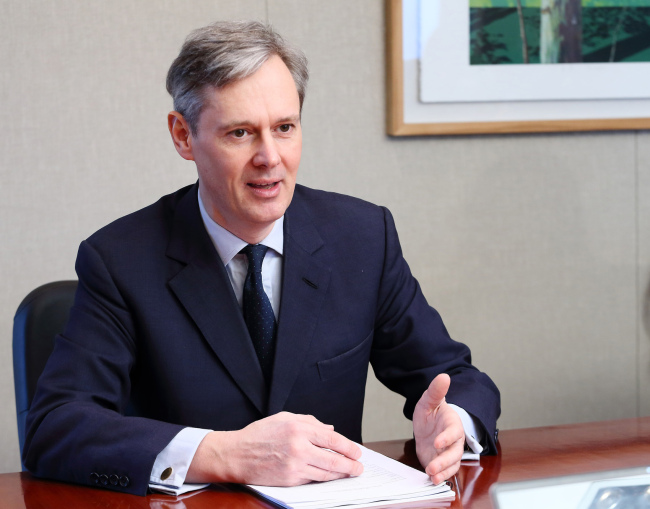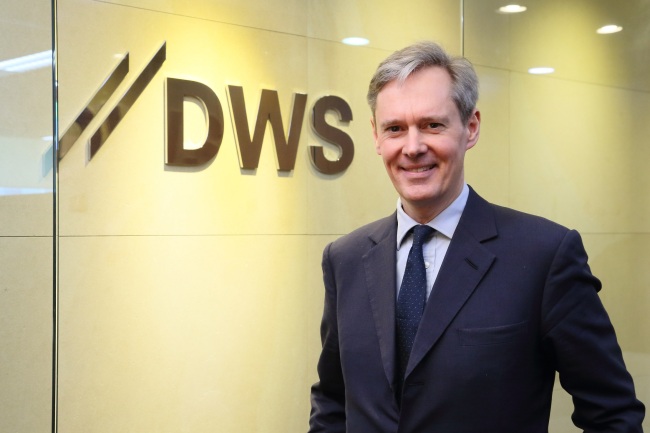The strategy of incorporating environmental, social and governance-related considerations into investment portfolios has become crucial for financial institutions, not for philanthropic reasons but for the sake of risk management and higher returns in the long term, according to the head of sustainable investing at the asset management arm of Deutsche Bank.
“For us, such strategy or ESG investing is an essential risk management tool, which helps us reduce possible drawdowns by measuring extra-financial factors and steering clear of sudden negative events,” Michael Lewis, head of ESG Thematic Research at DWS, told The Korea Herald in an interview.
 |
Michael Lewis, head of ESG Thematic Research at DWS, the asset management arm of Deutsche Bank. (DWS) |
The Volkswagen emissions scandal, for instance, was a negative example demonstrating how noncompliance with environmental regulations may act as a downside risk for the industry and investors, the ESG expert said.
“The concept of sustainable investing has existed since the 1970s, but it was in recent years that detailed research to connect ESG to financial performances has picked up speed,” Lewis said.
The watershed point was 2015, when the Paris Agreement was adopted and the agenda of climate change was officially recognized as a major threat to sustainability, according to the official.
In line with such trend, Deutsche Bank carried out an extensive restructuring in 2017 to give ESG issues a higher priority and to create a sustainability council of senior managers that is dedicated to coordinating ESG activities across the bank’s divisions.
Known for its competency in sustainable investing actions, the Germany-based banking group was also the first commercial financial institute to be accredited by the United Nations’ Green Climate Fund.
As for the asset management arm DWS, it reported 20 billion euros ($22.7 billion) in ESG assets under management as of end-2017. The corresponding figure for 2018 is expected to have risen, with the final announcement slated for March, the official added.
“There isn’t really one single way to define ESG investing,” he said, citing various terms, such as responsible investing, sustainable investing, impact or thematic investing, and impact-first investing, each according to the level of financial returns that a company is ready to compromise for the sake of environmental or social outcomes.
The initial stage of ESG investing is responsible investing, which excludes industries or companies that are viewed to contain reputational risks and consequent financials risks.
“This is when one rules out companies involved in fossil fuels, tobacco, alcohol and other sectors that tend to stand at odds with public policies,” the research head said.
The next step, sustainable investing, involves an active selection of industries or companies that produce positive environmental or social outcomes.
While impact or thematic investing drives investors to allocate their assets to areas of passion, impact-first investing goes as far as prioritizing environmental and social returns ahead of financial ones.
“The DWS solutions include all of these four models of ESG investing, though what we do often falls much into the categories of responsible investing and sustainable investing,” Lewis said.
“The idea is to tilt the investment portfolio to better quality, in accordance to diverse investor needs.”
 |
Michael Lewis, head of ESG Thematic Research at DWS, the asset management arm of Deutsche Bank. (DWS) |
For DWS, a prime area of focus is the real estate sector, which has until recently been neglected in the study of ESG and its financial leverage.
“Over 2,000 academic studies that have been published since the 1970s show how incorporating ESG in investment decisions may improve performance and reduce risk, while only seven deal with the corresponding impact in the real estate sector,” Lewis said.
“But in fact, buildings are a key factor when it comes to climate change as they determine the quality of air and light for tenants, efficient energy costs for landlords, and more definitely, the carbon emission quantity in urban environments.”
A report released by the New York city government in 2018 showed that a mere 2 percent of the metropolitan city’s buildings -- mostly luxury skyscrapers -- emit nearly half of its carbon pollution.
“We expect similar situations in key Asian cities, including Seoul,” the DWS official said.
Underlining the importance of buildings in climage change and ESG investment, the asset manager allocated 9.4 billion euros to certified green-labeled buildings as of end-2017, which was almost half of its total ESG assets.
Such interest in carbon emission reduction and the related focus on urban buildings will continue to increase in the coming years, regardless of policymakers in power, the investment official added.
“It is true that certain policies in the United States have changed under President Donald Trump, especially on the federal level,” he said.
“But beneath the surface, powerful states and companies, as well as investors have visibly accelerated their moves towards carbon emission reduction.”
Contrary to general beliefs, European countries stand below the US in the number of signatories to Principles for Responsible Investment -- a key index in ESG evaluation. While Germany and France respectively hold 71 and 184 signatories, the US tops the list with over 300 signatory companies.
“There is also a high level of climate competition within the US, as leading industrial players such as Google, Microsoft, and Amazon have signed up to RE100, an initiative to commit to a 100 percent renewable energy supply by a given date,” Lewis said.
“State policymakers would find it difficult to run against the environment friendly trend as it would surrender job growth and economic development.”
As for Asia’s fourth-largest economy, which is recognized for its strong semiconductor and electronics businesses, the ESG expert pointed out physical climate risks.
In an assessment carried out in the wake of the Chan-Hom Typhoon, which swept across the Far East in 2015, DWS found that individual companies’ resilience to climate factors had immediate and tangible impact on their financial performances.
“This outcome made us aware as investors of the link between climate and business performance,” Lewis said.
“As a result, we increased efforts in encouraging investment in resilience, that is, focus more on the companies that are doing well in ESG-perspective risk management, taking a turn from the conventional way of excluding those that underperform.”
By Bae Hyun-jung (
tellme@heraldcorp.com)








![[Today’s K-pop] Blackpink’s Jennie, Lisa invited to Coachella as solo acts](http://res.heraldm.com/phpwas/restmb_idxmake.php?idx=644&simg=/content/image/2024/11/21/20241121050099_0.jpg)
